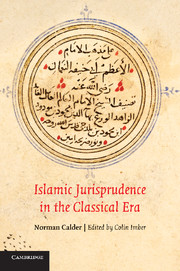Book contents
- Frontmatter
- Contents
- Editor's Preface
- Introduction
- 1 The Ḥanafī Law on Fornication
- 2 Nawawī and the Typologies of Fiqh Writing
- 3 Scholars, Muftis, Judges and Secular Power: The Need for Distinctions
- 4 The Social Function of Fatwas
- Afterword: Scholarly Priorities and Islamic Studies: The Reviews of Norman Calder (Robert Gleave)
- Principal Sources Used
- Index
Introduction
Published online by Cambridge University Press: 04 May 2010
- Frontmatter
- Contents
- Editor's Preface
- Introduction
- 1 The Ḥanafī Law on Fornication
- 2 Nawawī and the Typologies of Fiqh Writing
- 3 Scholars, Muftis, Judges and Secular Power: The Need for Distinctions
- 4 The Social Function of Fatwas
- Afterword: Scholarly Priorities and Islamic Studies: The Reviews of Norman Calder (Robert Gleave)
- Principal Sources Used
- Index
Summary
It is unfortunate that these four studies, the final reflections of Norman Calder on classical Muslim jurisprudence, cannot be presented here in their intended context. The chapters are clearly part of a larger, unfinished project, but Calder left no suggestion of a ‘structure’ into which these studies might be slotted. There are no ‘introductory remarks’ that might ease the reader into the work, preparing him or her for the rigours to come. They were given to Norman's friend and colleague, Colin Imber, for editing as individual files (a task for which he is owed much thanks). Mercifully, and almost as a concession to a less initiated audience, Calder does (at least) open each chapter with an introductory passage. He also makes frequent reference to how a specific point is related to a (perceived) general characterisation of classical Muslim legal literature. These topical comments are buttressed by a few asides and correctives concerning contemporary and past Islamic legal scholarship. Notwithstanding these hints at a more general ‘thesis’ into which the four chapters fit, greater detail of the stage on which the Calder's analysis was to be set would have been useful. Calder was a structured thinker, and each chapter (both those written and those that perhaps never were) would have had a role. These roles can only be estimated through deduction and inference, and even then with varying degrees of conviction on my part.
- Type
- Chapter
- Information
- Islamic Jurisprudence in the Classical Era , pp. 1 - 21Publisher: Cambridge University PressPrint publication year: 2010

